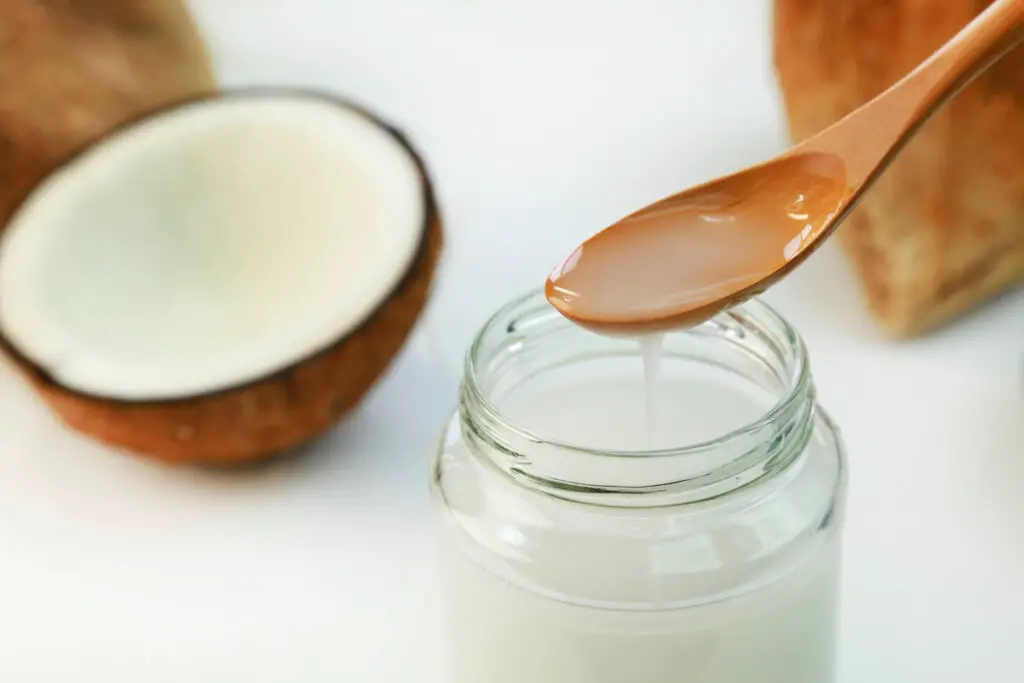
Coconut oil is becoming increasingly popular as an all-natural, versatile beauty product. Many people are touting its benefits for skin whitening, but does it really work? Is it safe to use?
Let’s take a closer look at how using coconut oil for skin whitening can change your skin and its potential to reduce melanin production and brighten skin tone.
Contents
- 1 Should You Use Coconut Oil for Skin Whitening?
- 2 Which is The Best Coconut Oil for Skin Whitening?
- 3 Does Coconut Oil Lighten Dark Inner Thighs?
- 4 Can I Use Baking Soda and Coconut Oil for Skin Whitening:
- 5 Can I Use Lemon and Coconut Oil for Skin Whitening?
- 6 Benefits of Using Coconut Oil on Skin Every Day:
- 7 Conclusion:
Should You Use Coconut Oil for Skin Whitening?
The answer is yes, but with some caveats. Coconut oil contains lauric acid, which has been found to reduce melanin production and lighten dark spots on the skin.
However, it should be noted that this effect is not permanent and only lasts while you are using the product.
Additionally, coconut oil alone may not provide the desired results; it will need to be used in conjunction with other treatments such as chemical peels or microdermabrasion.
How Long Does Coconut Oil Take To Lighten Skin:
The amount of time required for skin whitening varies from person to person.
Generally speaking, it can take anywhere from a few days to several weeks for noticeable changes in skin tone when using coconut oil for skin whitening.

It’s important to note that these results are temporary and that long-term effects will require ongoing treatment or maintenance.
Best Way to Use Coconut Oil for Skin Whitening:
Coconut oil can be used directly on your skin or consumed orally in order to achieve a lighter complexion over time.
- When applying topically, make sure you are using pure organic coconut oil and apply once or twice daily after cleansing your face.
- You can also add 2 tablespoons of coconut oil into your diet every day; this will act as an antioxidant agent and help reduce inflammation while helping your body produce more collagen which promotes a brighter complexion over time.
Which is The Best Coconut Oil for Skin Whitening?
When it comes to selecting the best coconut oil for skin whitening, you want to make sure you’re buying a high-quality product that is free from any unnecessary additives.
Look for organic coconut oil that has been cold-pressed and unrefined as these types of coconut oils are more effective at reducing melanin production than those that have been processed or refined.
Additionally, look for coconut oil that is free from fragrances or other artificial ingredients as these can be irritating to the skin.
Does Coconut Oil Lighten Dark Inner Thighs?
Yes, coconut oil can be used to lighten dark inner thighs; however, it is not a permanent solution and will only provide temporary results.
Coconut oil can help reduce the appearance of dark spots on the inner thighs by reducing inflammation and melanin production over time.
Additionally, you may want to consider incorporating other treatments such as chemical peels or microdermabrasion in order to maximize the results of skin-lightening treatments.
Overall, using coconut oil for skin whitening can be beneficial, but it should not be considered a miracle cure.
While it may help reduce the appearance of dark spots on your inner thighs, long-term results will require ongoing maintenance and treatment.
Can I Use Baking Soda and Coconut Oil for Skin Whitening:
Yes, you can use baking soda and coconut oil for skin whitening, but it is important to note that this combination does not provide lasting results.
Baking soda works as an exfoliant to remove dead skin cells from the surface of your skin while coconut oil helps reduce inflammation and melanin production over time.
Additionally, it is important to note that baking soda can be quite harsh on the skin and should not be used too often.
When using this combination, it is best to limit its use to once or twice per week in order to avoid any potential damage or irritation.
Can I Use Lemon and Coconut Oil for Skin Whitening?
Yes, you can use lemon and coconut oil for skin whitening; however, it is important to note that this combination can be quite harsh on the skin and should only be used in moderation.
Lemon juice contains citric acid which works as a natural bleaching agent and helps reduce the appearance of dark spots over time. Coconut oil helps to moisturize the skin and reduce inflammation, which can help brighten your complexion.
When using this combination, it is best to limit its use to once or twice per week in order to avoid any potential damage or irritation.
Additionally, make sure you always wear sunscreen when going outside as lemon juice can make your skin more sensitive to UV rays.
Benefits of Using Coconut Oil on Skin Every Day:
Using coconut oil on your skin every day offers a variety of benefits.
- It is naturally anti-inflammatory and anti-microbial, so it helps to reduce redness, itching, and irritation.
- Coconut oil is a great moisturizer that can help keep skin soft and supple all day long.
- Its fatty acids help to nourish the skin, and its antioxidants fight free radicals which can damage the skin cells, leading to premature aging.
- It can also be used as an effective cleanser for both the face and body that won’t strip away essential moisture or leave behind any greasy residue.
- Additionally, coconut oil has been shown to have sun protective properties which can help guard against UV damage from the sun’s rays.
- With consistent use, coconut oil can help improve the overall health of your skin, giving you a healthy glow that will last all day long.
Conclusion:
Using coconut oil for skin whitening is possible but not without certain risks associated with its use.
If you choose to use coconut oil, make sure you do so responsibly by following the proper application techniques and consulting with a dermatologist if needed before starting any type of treatment plan.
With the right approach, however, you could potentially enjoy a brighter complexion over time without any adverse side effects!














